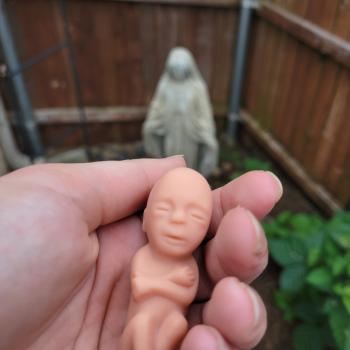"Walk across the grass," she says. "Come to the tree."
It's dark. The wind is in the trees, and the air is suffused with sticky moisture that makes just sitting in the grass a sweat-drenched activity. But she sits before us, a woman in her 40s or 50s, a black cloak concealing her body except for the ghostly visage of her mouth, glowing orange in the firelight. At her side stands a man dressed in black, wearing a tall, wide-brimmed hat. He carries an iron-tipped spear in his hands.
I have never met these people before tonight, and I will never meet them again. But they have offered me a dangerous gift: a mystic vision, a journey to Somewhere Else. I have entrusted them with my consciousness. That might not sound like much, but ask anyone who dabbles in mysticism: there are dangers in spiritual journeys. You don't always come back.
I shut my eyes, like I should have ten minutes ago. She speaks to us, droning, dream-like, calling us toward the tree.
They call it the World Tree, for it holds the entire universe within its branches: three worlds above, three worlds below, and three worlds in-between. In my trance I see the plumes of its branches stretch out for miles in every direction from its thick gray trunk. The tree's leaves are a vivid green; I am caught in their shade within three steps.
"Come closer," she whispers. "Come to the tree."
My steps don't bring me much closer to the trunk; the distance between the edges of the tree's reach and its center seems limitless. But in the logic of dreams, my next step suddenly brings me to the gnarled bark of the tree's trunk. The tree towers over me, higher than any skyscraper, each crevice in its surface like a chasm, each root like a mountain.
My breath leaves me. The tree is more real than real. I feel its roughness beneath my fingers, smell the wet grass beneath my feet. I hear something chatter, and look up to see a squirrel the size of a dog hanging on the bark.
"Now," she says. "Down. We go down . . . Down into the roots, down into the earth . . ."
And we do.
I fall into the soil, clinging to the spiraling roots of Yggdrasil, climbing hand-over-hand down the path into the world below. I feel a chill wind, even though warm sweat continues to pool on my skin; at the corner of my sight I see a land made of snow and death.
Down, down, down. Down to the well at the root of the world.
Without noticing the transition I find myself no longer clutching to the wood of the tree, but instead in a cave filled with the snaking trails of roots. There is a well at the center of that place with three women standing around it; all three of them are the woman in the black cloak.
"Come to the well," she says, "and drink."
The water is freezing, like a just-melted glacier. I shiver even as I drink the rest from my cupped hands.
I find myself thinking, "Why am I shivering? In the real world, it's eighty-five degrees."
And a voice—like the voice of the woman in black, but not her voice—calls back. "What is the real world?"
We stay there for centuries. The woman in black asks us, one by one, for a question. I hear the voices of the others, but not the questions they ask: they are with me, but I am not with them. And then the woman comes to me.
"What wisdom would you find at the well of wyrd?"
There were so many questions I had when I sat down in this field, ready for the ritual. I was 18 years old, had just finished my first year of college, had just had my first taste of adulthood. I had questions: about school, about women, about writing. Life questions. I was at the age to decide my life: I sure I could have used the guidance.
But all that seemed very far away when the woman in black asked her question.
"What am I doing here?" I ask. "Is this where I am meant to be?"
I had been a pagan my whole life, but specifically, I had been raised a Wiccan: I had been raised in the arms of the Lord and Lady, worshipping them by light of the sun and moon. This was my first experience with something else, something strange and familiar: my first encounter with wyrd.
I knew immediately that this appealed to me. I had known of the Norse myths since I was a child, of course, and had always felt fondly toward the gods of Asgard, but I had never experienced them so directly before. And yet I was, in a way, frightened: I had heard the heathens talking before the ceremony, and the way they talked, there would be no going back from this. They even signed contracts declaring that they would have no other gods before these, a declaration which, then and now, fills me with unease.





